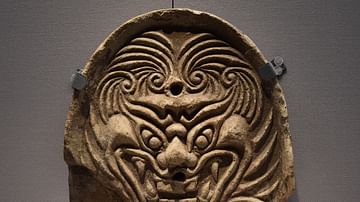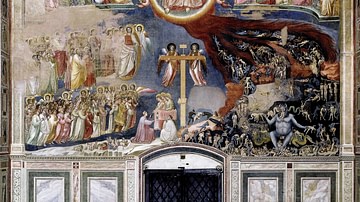Search
Did you mean: Delos?
Search Results

Definition
Zorvanism
Zorvanism (also given as Zuvanism, Zurvanism) was a sect of the Persian religion Zoroastrianism which emerged in the late Achaemenid Empire (c. 550-330 BCE) and flourished during the Sassanian Empire (224-651 CE). It is often referenced as...

Article
Enuma Elish - The Babylonian Epic of Creation - Full Text
The Enuma Elish (also known as The Seven Tablets of Creation) is the Babylonian creation myth whose title is derived from the opening lines of the piece, "When on High". The myth tells the story of the great god Marduk's victory over the...

Article
Inanna's Descent: A Sumerian Tale of Injustice
The Sumerian poem, The Descent of Inanna (c. 1900-1600 BCE) chronicles the journey of Inanna, the great goddess and Queen of Heaven, from her realm in the sky, to earth, and down into the underworld to visit her recently widowed sister Ereshkigal...

Article
Twelve Menacing & Protective Mythological Figures
The term mythology comes from the Greek words mythos (“story of the people”) and logos (“word”) and so is defined as the spoken (later written) story of a culture. Modern scholars have divided myths into different types which serve many different...

Article
Ghosts in Ancient Japan
Ghosts (obake or yurei) appear in ancient Japanese folklore and literature, usually in moral tales designed to both warn and entertain but they were also an important element of ancestor worship. If the deceased members of a family were not...

Article
The Nimrud Dogs
The Nimrud Dogs, five canine figurines found at the ancient Mesopotamian city of Nimrud, were only a few of the many startling finds in the region during the 19th century when expeditions were sent to corroborate biblical narratives through...

Article
Angels in Christianity
Angels in Christianity act as messengers of God, bring good news, and help believers. Their role developed from the function of angels in ancient Judaism but continued to evolve as Christianity became a separate religion. Jewish & Zoroastrian...

Definition
Mesopotamia
Mesopotamia (from the Greek, meaning 'between two rivers') was an ancient region located in the eastern Mediterranean bounded in the northeast by the Zagros Mountains and in the southeast by the Arabian Plateau, corresponding to modern-day...

Definition
Shiva
Shiva (Siva) is one of the most important gods in Hinduism and a member of the holy trinity (trimurti) with Brahma and Vishnu. Shiva is a complex character who may represent goodness and benevolence, and he serves as the Protector. Shiva...

Definition
Ishtar
Ishtar (Inanna in Sumerian sources) is a primary Mesopotamian goddess closely associated with love and war. This powerful Mesopotamian goddess is the first known deity for which we have written evidence. While largely unknown in the modern...